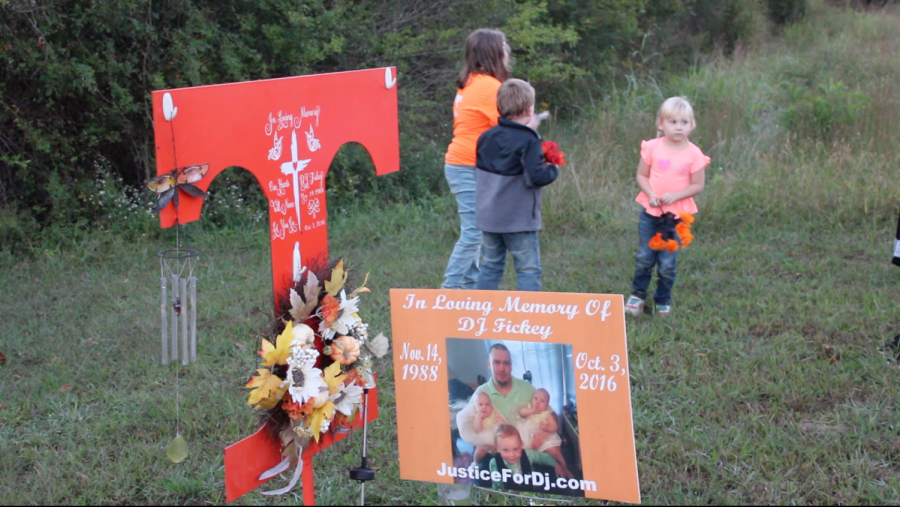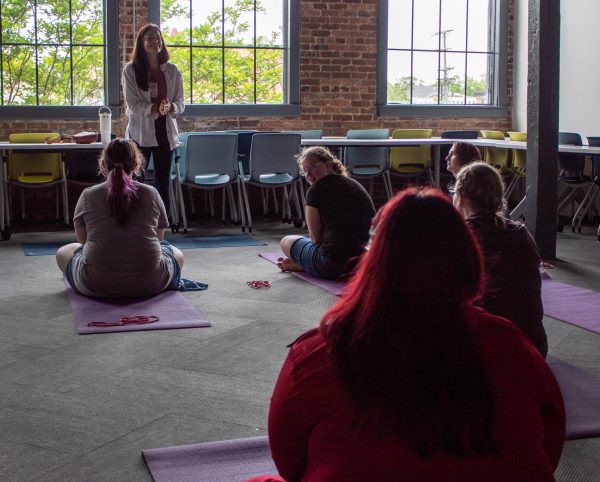Justice for DJ Fickey: killer is still free
Brooke Freundschuh | A&E Editor
Above is DJ Fickey’s memorial in Walker County, Ga. Amanda Shirley’s daughter, Serena and Fickey’s children, Jack and Paisley wait patiently to decorate it with new flowers.
October 15, 2020
What is it like to wake up every day knowing the man who killed your brother walks free?
This question is one that no one should have to ask themselves. The answer, however, is revealed in the life of Amanda Shirley.
On Oct. 3, 2016, Donald James Fickey Jr., better known as “DJ,” sat in a well-known drug house in Walker County, Ga. He was there with his wife and his wife’s boyfriend, whom she was having an affair with. He was tied to this tumultuous love triangle by a desire to remain with and take care of his wife for the sake of their two-year-old son and twin daughters, who were only a year old.
That morning DJ texted both his mother and one of his best friends, begging them for rides, saying it would save his life because he and the boyfriend were trying to kill each other.
“I’m going to end up dead here,” DJ said in the text message.
Within just three minutes after he sent the last text message, he was dead. The coroner ruled the death a suicide, despite multiple witnesses present saying they saw the boyfriend shoot him.
Now four years later, his sister, Amanda Shirley, has fought tirelessly to bring justice to her brother’s case. The county would never open a criminal investigation against the boyfriend so the case was submitted to the Georgia Bureau of Investigation, which began a long fight to be heard and be taken seriously since drugs were involved at the scene.
“They have enough evidence as it is,” Shirley said. “That’s why the detectives originally handed it over to the district attorney four years ago as a homicide case. The district attorney refused to prosecute or bring charges, because it was listed as a suicide by the state crime lab. The gun that was never tested for prints or anything is still sitting in the evidence room.”
Shirley speculates that the main reason for the lack of pursuit for justice is local officials trying to cover up that the case was originally handled poorly and that the suicide ruling was false. There is still much that can be done to help Fickey’s case, including testing the gun with which he was shot for fingerprints. The gun still remains in an evidence locker untested.
“Everybody knows what this was,” Shirley said. “They know it was a major mistake.”
Shirley faces a continuous struggle to even get in contact with law enforcement.
“The sheriff in four years has never responded to me, never called me back or emailed me back,” she said.
Because it is not an open case in the county, Fickey’s family do not have access to resources such as family advocates within the law enforcement. Like many true crime cases, it has come to the point where media coverage appears to be the only hope for legally proceeding.
“Once you get enough people built up and get that army behind you to be a voice for someone, then that’s when the pressure comes,” Shirley said. “Then bigger media gets involved and then law enforcement sometimes will do something. You’re constantly reaching out to podcasters and youtubers and news outlets and sending them the files and the reports, begging them to cover your brother’s case to get that pressure so that something will be done. It’s a nonstop battle.”
As for her personal life, Shirley has to seek psychiatric help to deal with post-traumatic stress disorder in response to her brother’s death. She struggles to feel like she is a good parent and wife, when she is constantly dealing with her brothers’ case or the emotional stress caused by it.
About a year ago, another trouble presented itself to her: she was diagnosed with cancer. Shirley is currently battling three types of cancer, including in her thyroid. She has undergone a major surgery. Currently, she is suffering from the deficit of money to pay for needed treatments because she refuses to use money allocated for her brother’s case.
“It’s an everyday battle,” Shirley said.
In Aug. 2020, a huge development was made in the case: the Georgia Bureau of Investigation changed Fickey’s manner of death to undetermined as opposed to suicide, which opens the door for more to be done.
Every year on Oct. 3, Shirley as well as many of Fickey’s family and friends gather to celebrate his life in a vigil, including sky lanterns and a trip to his memorial to honor him. This year, a new tradition was started: the burning of the death certificate reading “suicide.”
‘I think it’s strange that in the worst year of everyone’s lives that I got good news,” Shirley said. “For us to get good news in a bad time for everybody is amazing.”













Esmeralda • Jul 22, 2021 at 10:54 pm
After viewing this case .It’s obvious that the state police acting poorly . Get a fund me page and summit for review with a lawyer base on the break of chain of custody because it skips the basic procedures of filing of evidence. This is the chain of evidence which all death have to be processed . Saw this an Kendall Rae. Hope it helps.